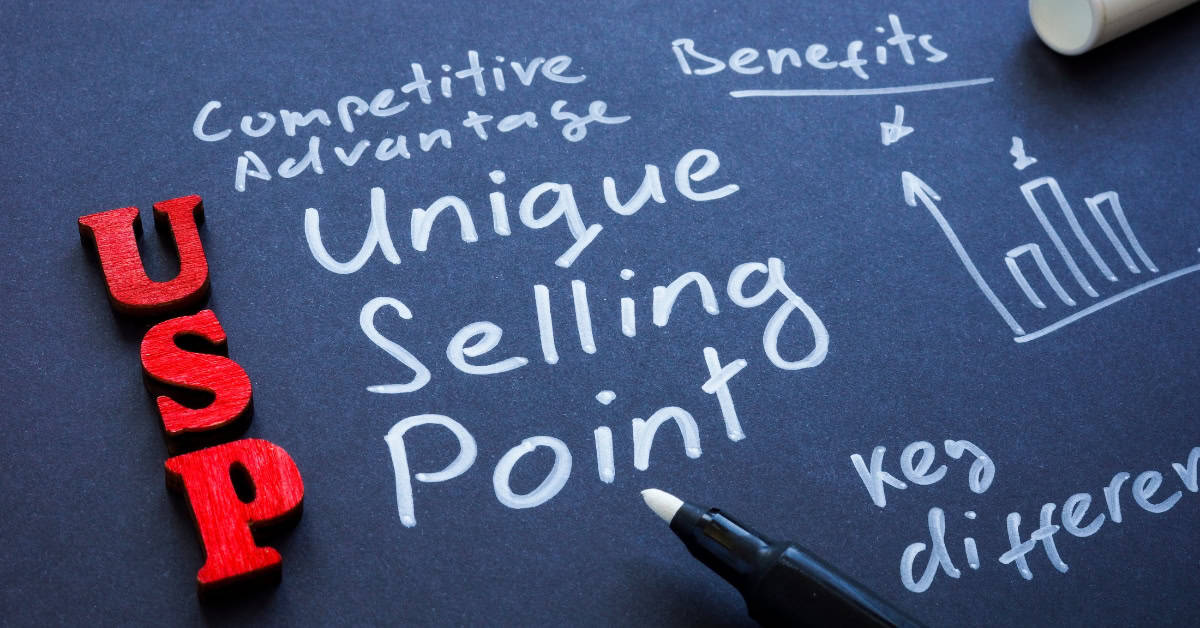What makes the difference between success and failure in your direct response marketing?
It’s what Rosser Reeves, in his book Reality in Advertising, called the Unique Selling Proposition (or USP).
But what is a USP?
It’s the factor that sets your product or service apart from all the similar products your competitors are marketing.
And you must have one for all forms of direct response advertising – digital ads, video, direct mail, television, podcasts… all of it.
It’s one of the first things I require my copywriting team to do for a prospect.
Let’s look at some USPs to see them in action…
“Still the Low Price Leader… and more”
Lucky Supermarkets’ USP is that they have the lowest prices: “Still the low-price leader… and more.”
But they also have a more subtle one. Namely, some stores promise low prices, and some promise service and other amenities… but Lucky’s offers BOTH!
“When You Care Enough to Send the Very Best”
Recognize that one?
It’s Hallmark Cards’ USP… and it’s such a part of the pop culture now that some cards parody it… like “I care enough to send the hairy beast.”
Hallmark Cards’ USP is that their cards are the absolute best and that no caring person would want to send anything else. Just like L’Oréal’s “you’re worth it,”
Hallmark Cards are the best… for the best.
For investment advisor Bill Donoghue, we made his USP clear:
“America’s #1 Safe Money Expert.”
Not only is he a leading expert, but the words “safe money” are reassuring to cautious investors.
And for DTN, in their marketing geared to bankers, we created the USP: “The first low-priced, time-sensitive services in America.”
The prospect instantly got the message that DTN’s system was not only a leader in its field for speed, but the price was right as well.
It’s important to note that, in these examples, we went out of our way to ensure the customer was aware of the USP.
The customer won’t find out why your product is unique, special, or better unless you tell them.
For direct mail, landing pages, and emails, I like it at the start, middle, and end… maybe more.
Don’t assume that because you know your product is great, your prospects know it too.
That said, the most difficult part of using a USP in your advertising or marketing is… creating it!
How to Create a Winning USP
The most obvious way to create a USP is to sell a totally unique product or service. Or add something to your good but rather common product that makes it unique.
But, if neither of these scenarios is possible, then it’s up to you to create your own USP.
4 Steps to Success
The first step in the process is to ask yourself some questions…
- How does my product differ from the competitors?
• Is my product/service somehow related to current events or topics of interest?
• Is my staff the most knowledgeable around?
• Is my product/service of the highest quality? Or is it disposable?
• What is my inventory like? Do I have the largest selection of a given type of product?
• What is my customer service department line? Do they bend backward to ensure the customer is completely satisfied with the product/service?
• What is our founding or history?
And so on.
Once you’ve answered these questions, you’ll better understand some possible USPs.
Besides noting the above-mentioned qualities (inventories, services, etc.) when creating your USP, there are three other simple ways to do it.
- Your guarantee as promised. An unusual guarantee as a USP does several things: it distinguishes the product from the competition; it illustrates the marketer’s confidence in the quality of the product or service; and it makes the customer feel that the purchase is “safer” than one that offers no guarantee. Upon reading a guarantee that offers all his money back if he isn’t satisfied, a customer will say to himself: “If they’re willing to do that, then the product must be good.”
- Company Image. This type of USP can be used very successfully. For example, let’s say that you sell laundry detergent that is fully biodegradable and produces no harmful chemicals. Your company can then state in its USP that it is a leader in environmentally safe technology and that it cares very much about the environment. Environmental issues are a “hot” topic, and your product stands to capitalize on this and sell very well.
- Price. If your product has a lower price than any of its competition, that’s a powerful USP. The price should be prominently featured in all advertising. But beware: the low price should be explained. Upon seeing a very low-priced product, a prospect will ask himself: “Why are they selling it so low?” Then, he may wonder if the low price means the product is bad or the person selling it is untrustworthy. Therefore, you must make clear to your prospect why the price is so low (like you have a low markup rate or do all the work in-house, etc.…)
- A special claim. If your product does something no one else can, that is a powerful USP. An example of this is: “Colgate cleans your breath while it cleans your teeth.” When creating your USP, remember to think about the “suffering point.” What pain or problem is your client suffering that your product or service can help overcome? Consumers aren’t mind readers. You must tell them how your product or service will assuage their suffering point. If you make them realize that you understand their needs and sympathize with their problems, let them know that your product or service can help them, and find a solution to this problem, you’ll go a long way towards creating a powerful USP.
Why a Not-So-Unique USP Worked
Of course, not every USP you create must be unique. Sometimes, a not-so-unique USP works too.
Here’s an anecdote from the career of marketing pioneer Claude Hopkins.
He was creating ads for a failing brewery, and the copy of these ads implied that the beer was “pure” by virtue of the brewery’s spring water.
The brewer told Hopkins that their process was not unique. In fact, it was the same process used by every brewery. Hopkins asked if the public knew anything about this process. It so happened that the public did not. When the brewery made this spring water in its USP, the public thought it was special and that this brewery’s beer was worth buying. Why? Because it was the water.
In short, having a USP is critical to your marketing efforts. Creating one that will distinguish your product or service in its field takes a little effort and thought… but it’s not impossible.
We can help. Give us a call at 615-933-4647 or email Michael at [email protected].


